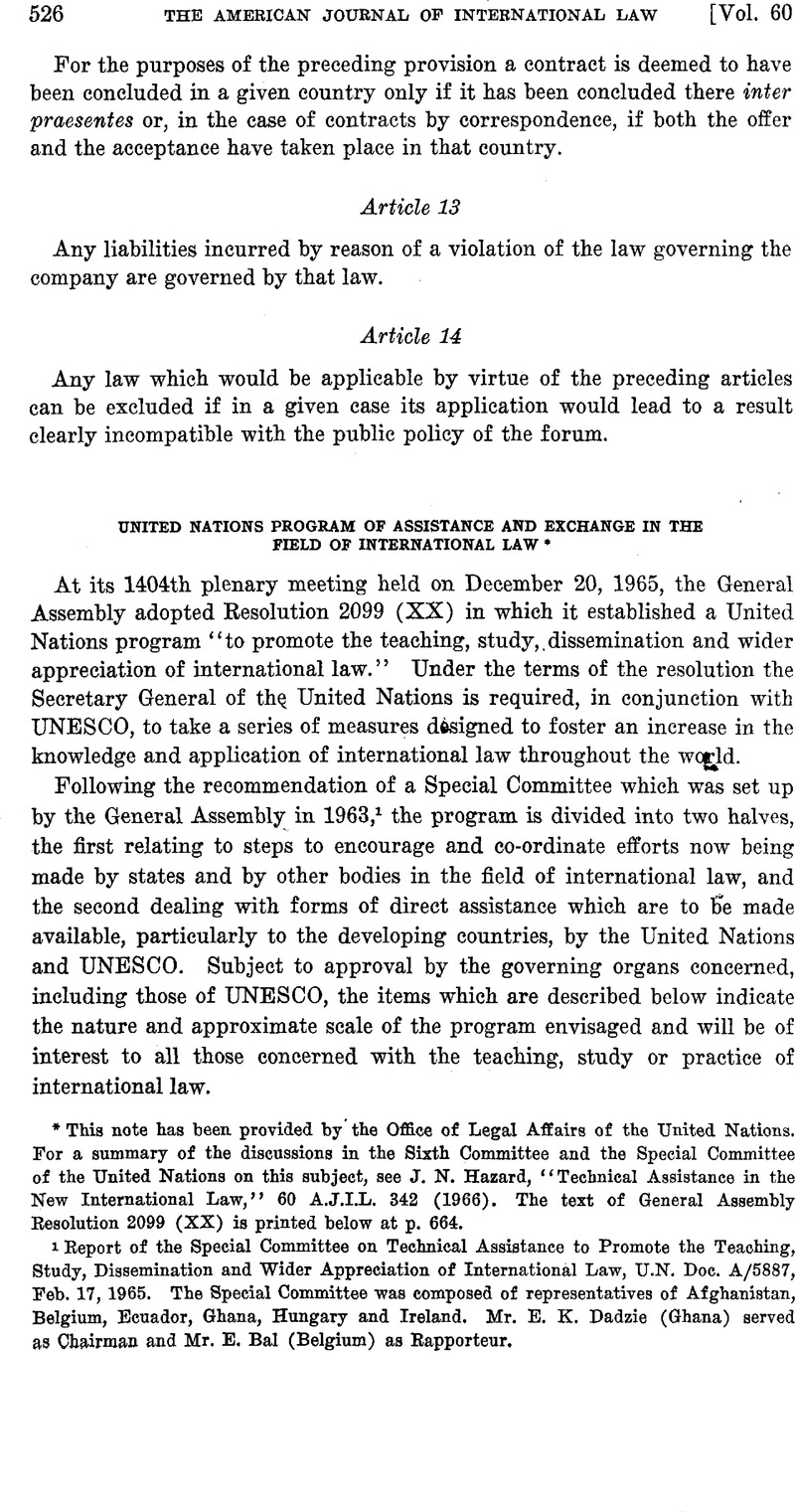No CrossRef data available.
Published online by Cambridge University Press: 28 March 2017

1 Report of the Special Committee on Technical Assistance to Promote the Teaching, Study, Dissemination and Wider Appreciation of International Law, U.N. Doc. A/5887, Feb. 17, 1965. The Special Committee was composed of representatives of Afghanistan, Belgium, Ecuador, Ghana, Hungary and Ireland. Mr. E. K. Dadzie (Ghana) served as Chairman and Mr. E. Bal (Belgium) as Rapporteur.
1 For some detailed recent writings on the possibility of increased participation of Canadian provinces in international life, see Louis Sabourin, “La participation des provinces canadiennes aux organisations Internationales,” 3 The Canadian Yearbook of International Law (Annuaire Canadien de Droit International) 73-99 (1965); Jacques- Yvan Morin, “La conclusion d'accords internationaux par les provinces canadiennes à la lumière du droit comparé,” ibid. 127-186; and Edward McWhinney, “Federalism, Biculturalism and International Law,” ibid. 100-126.
2 This is due to the decision of the Judicial Committee of the Privy Council in (Re Weekly Rest, Minimum “Wages and Hours of Labour Acts) A.-G. for Canada v. A.-6. for Ontario and Others, [1937] A.C. 326; 31 A.J.I.L. 348 (1937).
3 For an English translation of the text of this entente, see 1 Education Weekly, A Department of Education Bulletin 199-202 (1965) (Province of Quebec).
4 The English translation of the exchange of letters obtained from the Department of External Affairs contains in the Canadian letter addressed to the French Government the following passage: “ I have the honour to inform you that this ‘Entente between France and Quebec on a Programme of Exchanges and Co-operation in the Field of Education’ meets with the concurrence of the Government of Canada.“
5 H. C. Deb. (Can.), April 26, 1965, at 395.
6 Ibid. 396-397. For text of a statement issued by the Secretary of State for External Affairs on April 23, 1965, see “The Provinces and Treaty-Making Powers,” 17 External Affairs 306 (1965).
7 H. C. Deb. (Can.), April 27, 1965, at 629.
8 Ibid., May 14, 1965, at 1290.
9 Ibid. at 1291. The section 92 to which reference is made is found in The British North America Act, 1867, 30-31 Victoria, c. 3 (United Kingdom).
10 For the English text of the agreement, see 17 External Affairs 514-516 (1965); the French text will be found on the corresponding pages of the French edition of this publication. The agreement was drawn up in the English and Trench languages, both texts being equally authentic. A further accord cadre—this one concerning cultural and technical affairs—was signed in Algiers on March 16, 1966, between Canada and Algeria. See La Presse, Montreal, Que., March 17, 1966, p. 33, cols. 7-9.
11 For the English text of the exchange of letters, see 17 External Affairs 516-517 (1965); the French text will be found on the corresponding pages of the French edition of this publication.
12 For the text of the English translation of this entente, see 17 External Affairs 521- 523 (1965); the original French text will be found on the corresponding pages of the French edition of this publication.
13 For the English text of this exchange of letters, see 17 External Affairs 520-521 (1965); the French text will be found on the corresponding pages of the French edition of this publication.
14 The Franco-Canadian Agreement of Nov. 17, 1965, and the exchanges of letters dated Feb. 27, Nov. 17 and 24, 1965, were done in the English and French languages. This is in accordance with the practice of the Canadian Government to sign all official international agreements in English and French, each text being equally authentic. See, in this regard, Department of External Affairs Press Release, March 12, 1966: Speech of the Honorable Paul Martin, Secretary of State for External Affairs to the International Relations Club of the Université de Montréal, p. 14. In that speech he pointed out that the new agreement with the United States on air services had been done in English and French.
15 For the text of Art. 19(7), which is the federal clause in the Constitution of the International Labor Organization, see Hudson, 9 International Legislation 1942-1945, No. 665a, pp. 763-764. For another example of such a clause, see Art. 41 of the Convention Relating to the Status of Refugees, Geneva, July 28, 1951, in U.N. Doe. ST/ LEG/6, Aug. 5, 1957, Handbook of Final Clauses, p. 96. An identical clause is found in the following agreements: Convention on the Recovery Abroad of Maintenance, New York, June 20, 1956 (Art. 11), and Convention Relating to the Status of Stateless Persons, New York, Sept. 28, 1954 (Art. 37).
16 For a concise summary of the relationships of federal governments and component states in regard to treaties, see K. C. Wheare, Federal Government 169-186 (4th ed., London, New York, Toronto, 1963).
17 Attorney-General for Canada v. Attorney-General for Ontario, [1937] A.C. 326 at 353-354: “While the ship of state now sails on larger ventures and into foreign waters she still retains the water-tight compartments which are an essential part of her original structure.''